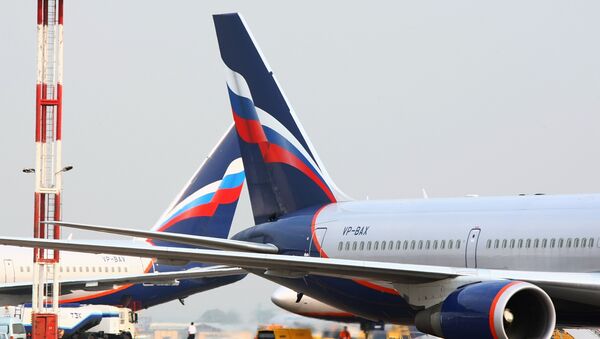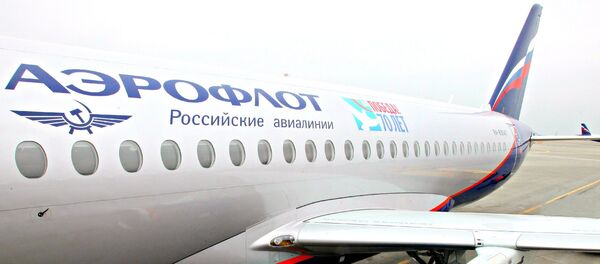New Delhi (Sputnik): As Aeroflot, the state carrier of Russia, celebrates the 60th anniversary of its Moscow-Delhi route, Sputnik talked to Amber Dubey, a partner and head of aerospace and defence at global consultancy firm KPMG, about passenger expectations and the opportunities India offers Aeroflot.
Congratulations @aeroflot on completing 60 years of flight operations from #DelhiAirport. Looking forward to an everlasting partnership with one of the largest airlines of Russia. pic.twitter.com/MZkJiFIHqi
— Delhi Airport (@DelhiAirport) August 18, 2018
Sputnik: Aeroflot is celebrating its legacy of 60 years of operation connecting India with Russia and Europe. What kind of opportunities is the airline looking at for expansion of business in India?
Amber Dubey: Given Russia's unique geographic location, it offers an attractive option for flights to Canada and northern USA through the polar route. Aeroflot's code-shares with Delta gives it access to all key locations in the US. There's a large Indian diaspora in and business travelers to North America. A lot of that traffic passes via the Gulf hubs. The bilateral quotas between Indian and most Gulf countries are nearly exhausted. India is not increasing the quotas, to protect the interests of its own carriers. The existing Indo-Russia bilateral quota is anyways heavily underutilized. India's National Civil Aviation Policy (NCAP 2016) has announced open skies with all countries beyond 5,000 km from India.
Aeroflot Soviet airlines poster, USSR, 1960s pic.twitter.com/gR8UEwP7d9
— Soviet Visuals (@sovietvisuals) August 16, 2018
Aeroflot, therefore, has a strong opportunity on the Indo-America route via Moscow. The ticket-pricing, additional goodies and layover time at Moscow may have to be tweaked to make it competitive vis-à-vis the strong gulf carriers.
Amber Dubey: Aeroflot is the logical choice for Scandinavia, the Baltic republics, and Eastern Europe, most of which are not well connected to India by air.
The successful conduct of the FIFA World Cup has given a tremendous boost to Russia's image as a safe, beautiful country with friendly, fun-loving people. It is time for Aeroflot to seize this opportunity and expand its presence in India.
President Vladimir Putin has praised the initiative by Russia’s biggest airline, Aeroflot, to provide Russian football fans with one-way tickets which will cost just five rubles ($0,09) during next year’s FIFA World Cup. https://t.co/HbFrri8faR
— Maher Safi (@mahersafi) January 1, 2018
There's a boom in outbound travel by Indians. Around 25 million Indians traveled abroad in 2017. According to the UN World Tourism Organisation (UNWTO), outbound travel from India may double to 50 million by 2020. That's a whopping increase of around 26 percet per annum. No wonder the Indian market is being wooed by all the leading global carriers.
Sputnik: How is operating flights in India different from operating elsewhere?
As oppose to western travelers, a significantly large section of Indian tourists travel in families or large groups. Many of them are finicky about food choices, especially vegetarians. Many tour operators arrange for Indian cooks to travel with them. Aeroflot may decide to have special packages for large groups with India-specific food choices as a key differentiator.
✈🇷🇺 #Russia's @Aeroflot is confidently advancing its 2025 Development Strategy! Already in the world's 20 leading airlines by passenger traffic, according to @ATWOnline and @FlightGlobal! https://t.co/YtH4tzVJQp
— РоссиЯ 🇷🇺 (@Russia) August 14, 2018
You are safer with #Aeroflot! pic.twitter.com/aXtV19FcpH
Sputnik: Given the Indian government's initiatives in promoting tourism, do you predict an increase in inbound traffic?
Amber Dubey: Inbound tourism to India is also growing thanks to an aggressive "Incredible India" marketing campaign by the Indian government.
Aeroflot can play a big role in collaboration with Indian carriers through code-shares. t has an interline agreement with a leading Indian carrier. That can be strengthened further through joint marketing.
The views and opinions expressed by Amber Dubey in this article are those of the speaker and do not necessarily reflect the position of Sputnik.



